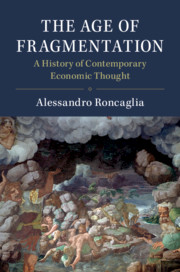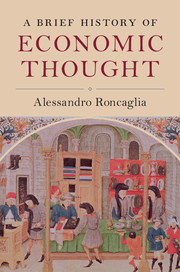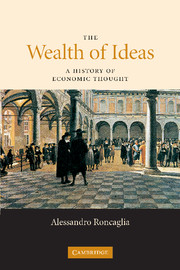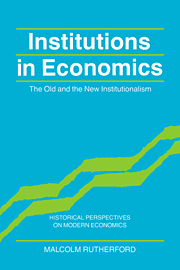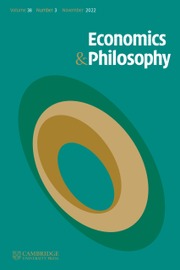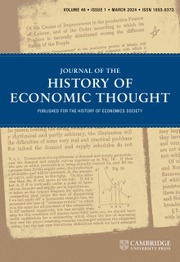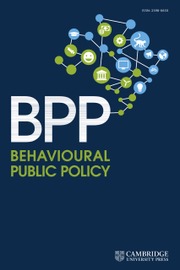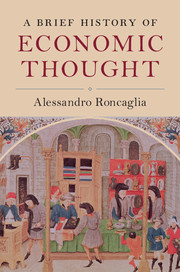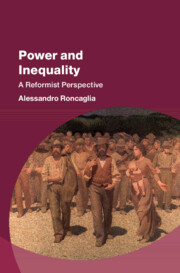The Age of Fragmentation
The field of economics has proliferated in complexity and importance since the Second World War. Alessandro Roncaglia recounts the history of the different approaches (marginalist, neoclassical, Keynesian, Austrian, monetarism, rational expectations, institutionalist, evolutionary, classical-Sraffian) and the different fields (micro, macro, money and finance, industrial and game theory, institutions, public finance, econometrics), illustrating the thought and personality of the most important contemporary economists (from Hayek to Sraffa, from Modigliani and Samuelson to Friedman, from Simon to Sen, and many others), focusing on the conceptual foundations of the different streams. At the same time he appraises critically the important debates and controversies in the field and concludes by discussing possible future directions for economic thought. This follow-up to The Wealth of Ideas: A History of Contemporary Economic Thought is a readable introduction to the contemporary economics discourse, accessible to economics students and informed general readers, and an important complement for advanced students and economists active in specialized fields.
- Reassesses the foundations of contemporary economics
- Fosters open debate among the different streams of economics
- Provides young economists with a wider view of their discipline
Reviews & endorsements
‘Professor Roncaglia is one of the world's leading authorities on the history of economic thought. He has written intellectual biographies of William Petty and Piero Sraffa, and a recent magnus opus – The Wealth of Ideas: A History of Economic Thought. This new book is a worthy sequel, with extended detail on more recent developments in the history of economic thought, and beautifully written. The book should be essential reading for any serious economist who wants to master the origins and historical progress of their discipline.' A. P. Thirlwall, University of Kent
‘Alessandro Roncaglia provides a masterly survey of a field of enquiry – contemporary economic research from the Second World War to the present day – characterized by great breadth and complexity. His inquiry into their interrelations and the underlying philosophies of the fragmented landscape of modern economics combines highly scholarly investigation with passionate denunciation of its limits. An indispensable teaching aid and guide through the meanderings of the economic profession of our times.' Maria Cristina Marcuzzo, Sapienza, Università di Roma
'Alessandro Roncaglia has crafted a tour de force. The Age of Fragmentation is a most worthwhile book, one that should be read by all economists no matter what their theoretical orientation is. Roncaglia demonstrates a vast storehouse of knowledge, acute analytical abilities, and sensible critical faculties.' John F. Henry, Levy Economics Institute of Bard College
‘… The reader can appreciate the bigger picture behind the usually fragmented approach to studying economics through his work. In addition, the often unseen and unappreciated threads linking the various economic schools of thought can be well appreciated as the author goes into great detail to present the growth of economic thought chronologically, providing the historical and political factors that shaped the various approaches.' Jiarui Wu, History of Economic Thought and Policy
Product details
January 2020Paperback
9781108745819
192 pages
228 × 153 × 25 mm
0.66kg
Available
Table of Contents
- 1. Introduction. A non-linear discourse
- Part I. The Background:
- 2. The foundations: classicals and marginalists
- 3. The immediate precursors
- Part II. The Giants of the Short Century:
- 4. The founder of neo-liberalism: Friedrick von Hayek
- 5. The revolutionary: Piero Sraffa
- Part III. The Fragmentation of the Mainstream:
- 6. The new microeconomics: general equilibrium and expected utilities, theory of industrial organization
- 7. The macroeconomics of the neoclassical synthesis
- 8. The myth of the invisible hand: neo-liberal streams
- 9. Applied economics and econometrics
- Part IV. The Weakening of the Paradigm:
- 10. Behavioural economics and bounded rationality
- 11. From efficient financial markets to the theory of crises
- Part V. Is a New Paradigm Possible?:
- 12. Post-Keynesian macroeconomics
- 13. Marxism, evolutionism, institutionalism
- 14. Ethics and the problem of power.

